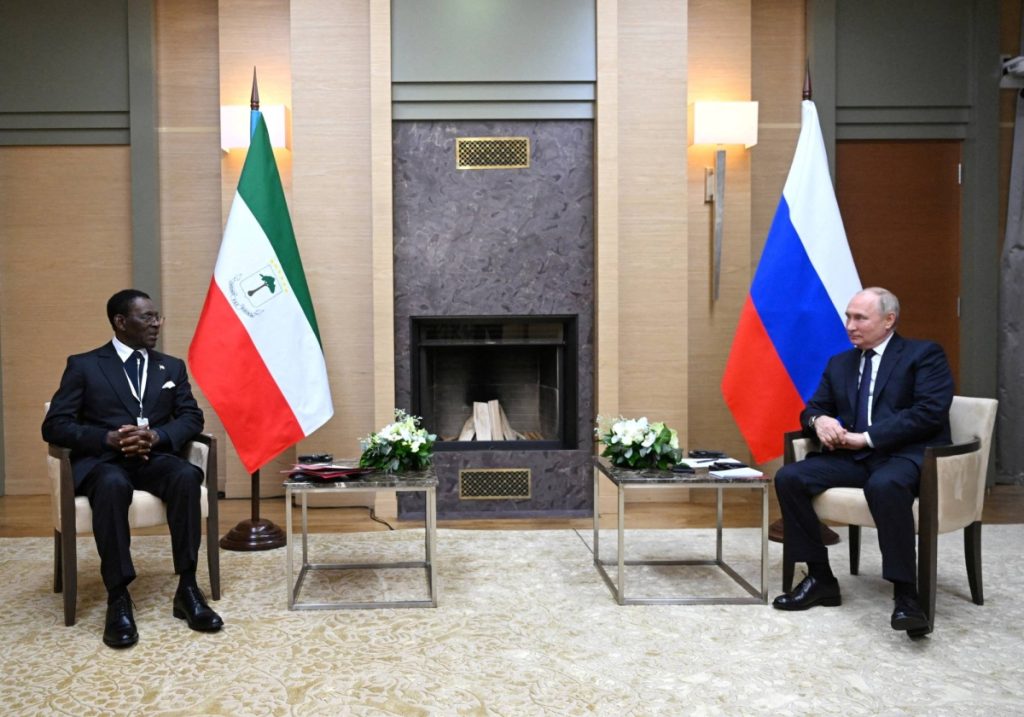Russia has reportedly deployed up to 200 military instructors to Equatorial Guinea, signaling a further expansion of its influence in Africa. The instructors, who are believed to be training the country’s elite guards, are stationed in the two main cities: Malabo, the capital, and Bata. This move follows earlier reports of Russian troops being stationed in the country, with their primary role being to safeguard the presidency of Teodoro Obiang Nguema Mbasogo, the world’s longest-serving leader.
The presence of Russian military personnel in Equatorial Guinea first emerged in August, with sources estimating that between 100 and 200 Russian troops arrived in the past two months. Some of these individuals are thought to be part of Corps Africa, a paramilitary group that was formerly known as the Wagner Group, a private military company that has become notorious for its involvement in conflicts across Africa and the Middle East. Following a reorganization, the group is now officially under Russian military command.
Russia’s increasing presence in Equatorial Guinea is part of a broader strategy to expand its influence across Africa, where it has been involved in providing military support to regimes and offering assistance in fighting insurgencies. In recent years, Moscow has sent mercenaries to various parts of Africa, including West and Central Africa, to protect governments, secure resources, and establish military footholds.
Equatorial Guinea, a small country with a population of 1.7 million, has been ruled by President Obiang since 1979. His leadership has been marked by widespread human rights violations, including allegations of arbitrary killings and torture. The country has also been criticized for its lack of political freedoms, with opposition parties banned and dissent suppressed. His son, Teodoro Obiang Mangue, the country’s vice president, has been at the center of numerous scandals and corruption investigations globally.
Reports suggest that the Russian instructors in Equatorial Guinea are primarily focused on training elite military units tasked with protecting the Obiang family. Some of the Russian personnel have been sighted in both Malabo and Bata, and their presence is seen as a direct response to ongoing concerns about potential threats to the Obiang regime.
The relationship between Equatorial Guinea and Russia has been growing over the years. Both President Obiang and his son have made multiple visits to Russia in recent years, exploring military, economic, and energy-related agreements. The country has also been engaged in talks with Belarus and China on similar matters, focusing on gas and mineral exploration deals.
In September, President Obiang publicly thanked Russian President Vladimir Putin for sending military instructors to strengthen his country’s defense capabilities. This development comes as Equatorial Guinea seeks to bolster its military capabilities amid increasing geopolitical tensions and the shifting balance of power in Africa. Moscow has used such alliances to deepen its footprint on the continent, often offering military support and economic deals in exchange for political loyalty and access to critical resources.
Tutu Alicante, a US-based human rights activist from Equatorial Guinea, has expressed concern that Russia’s growing military presence in the country could have significant implications for US interests in the region. Speaking to the Voice of America (VOA), Alicante said that Russia’s involvement is a clear demonstration of the country “flexing its military and economic muscles,” with a physical presence in Equatorial Guinea that could undermine US influence in the region. The US has previously had interests in the country, particularly in its energy sector, but these have declined in recent years.
In Africa, Russia’s increasing influence is being felt as some countries, particularly those in West Africa, shift away from traditional Western allies like France. These nations, many of which have experienced recent coups, have expressed frustration over what they see as insufficient Western support in addressing jihadist insurgencies and instability. As a result, some have turned to Russia for military and economic assistance, seeing Moscow as a more reliable partner.
Equatorial Guinea’s strategic location and its significant oil and gas reserves make it a key player in Central Africa, and Russia’s efforts to strengthen ties with the country are part of a broader strategy to secure access to Africa’s rich natural resources. Moscow’s involvement in African politics is likely to continue growing as it seeks to counterbalance Western influence on the continent, especially as regional powers look for alternatives to traditional Western partnerships.
The military presence of Russian instructors in Equatorial Guinea, while not unexpected given the country’s longstanding ties to Moscow, marks a significant step in Russia’s continued efforts to expand its geopolitical influence across Africa. As the continent’s political landscape continues to evolve, Russia’s support for regimes like that of President Obiang is likely to play a key role in shaping the future of African diplomacy and security.








